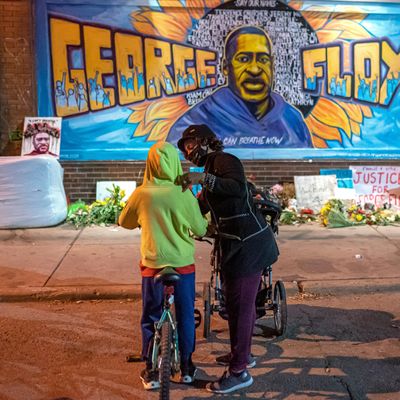
Former Minneapolis police officer Derek Chauvin was found guilty in April of three charges — second-degree unintentional murder, third-degree murder, and second-degree manslaughter — in the murder of George Floyd. On June 25, Chauvin was sentenced to 22 and a half years in prison. Though Chauvin’s trial has ended, the legal ramifications of the case are far from resolved — from the fate of the other officers involved in Floyd’s arrest to efforts by the federal government to address police brutality in Minneapolis and throughout the nation. Here’s what to expect in the coming weeks and months.
Chauvin Won’t Get a New State Trial
Hours before Chauvin was sentenced, Judge Peter Cahill denied a request for a new trial that was filed by Eric Nelson, Chauvin’s defense attorney, on May 4.
Nelson claimed that Chauvin did not receive a fair trial, citing alleged jury and prosecutorial misconduct, as well as Judge Cahill’s decision not to sequester the jury during the length of the trial.
Cahill wrote that Chauvin “failed to demonstrate” that there was misconduct by the jury or prosecution or that he was denied his right to a fair trial.
Nelson also asked for a mistrial prior to the verdict being revealed back in April, due to recent comments from Congresswoman Maxine Waters, who said protesters needed to “stay on the street” and get “more confrontational” if Chauvin were found not guilty. Cahill also denied that request.
The Federal Trial
A federal grand jury indicted Chauvin and the three other officers, Thomas Lane, J. Alexander Kueng, and Tou Thao, on charges that they violated Floyd’s constitutional rights when they detained and restrained him.
The indictment said that Chauvin deprived Floyd of the right to “to be free from an unreasonable seizure, which includes the right to be free from the use of unreasonable force by a police officer.”
Thao and Kueng are charged with not intervening to stop Chauvin’s unreasonable use of force. All four officers are accused of not providing Floyd with medical care when it was clear he needed it.
The State Trial of the Other Officers
Thomas Lane, J. Alexander Kueng, and Tou Thao, the three other officers on the scene during Floyd’s arrest, were originally scheduled to stand trial on August 23, according to the Minneapolis Star-Tribune.
But Judge Cahill announced that their trial will be pushed back to March 2022 in order for the federal trial to proceed and to allow for space between their trial and Chauvin’s due to the significant attention his trial received.
The former Minneapolis police officers face charges of aiding and abetting second-degree murder and second-degree manslaughter. Chauvin’s conviction suggests a trickier path forward for the officers’ defense, though the prosecution will still have to prove the extent of the role they played in an incident where the focus has largely been on Chauvin.
It remains to be seen if the officers will attempt a plea deal in light of Chauvin being found guilty.
Justice Department Investigations
U.S. Attorney General Merrick Garland announced that the Department of Justice was launching an investigation into the practices of the Minneapolis Police Department, one day after Chauvin’s guilty verdict was handed down. It would involve members of the U.S. Attorney’s Office for the District of Minnesota and the Justice Department’s civil-rights division.
“It will include a comprehensive review of the Minneapolis Police Department’s policies, training, supervision and use-of-force investigations. It will assess the effectiveness of the MPD’s current systems of accountability and whether other mechanisms are needed to ensure constitutional and lawful policing,” Garland said at a news conference.
He also said the investigation would try to determine whether officers participated in discriminatory conduct and if they provided fair treatment to people with behavioral-health disabilities. The department will release a public report with their findings, if a consistent pattern of misconduct is discovered within the MPD.
The attorney general said that this probe is separate from the Justice Department’s ongoing criminal investigation into George Floyd’s death.
Legislation in Congress
Congressional Democrats are still fighting to pass criminal-justice-reform legislation known as the George Floyd Justice in Policing Act.
A version of this bill was introduced and passed through the House last year, only to stall over opposition in the then-Republican controlled Senate. With Democrats holding a majority, albeit a slim one, in both chambers, the Justice in Policing Act was reintroduced this year and once again passed in the House.
The legislation calls for significant changes, including barring chokehold and cartoid holds on the federal level; banning some instances of no-knock warrants, which many believe contributed to the death of Breonna Taylor; and establishing a national registry for police misconduct, to prevent disciplined officers from simply moving to another force.
President Joe Biden and Vice-President Kamala Harris have thrown their support behind the bill and have pushed for it more forcefully since Chauvin’s conviction.
Addressing the nation hours after the verdict was declared, Biden said, “We also need Congress to act,” noting that Floyd was murdered nearly a year earlier and the bill named for him has yet to pass.
He continued, “It shouldn’t take a whole year to get this done. In my conversations with the Floyd family, I spoke with them again today, I assured them that we’re going to continue to fight for the passage of the George Floyd Justice in Policing Act, so I can sign it into law as quickly as possible. There’s more to do.”
“Last summer, together with Senator Cory Booker and Representative Karen Bass, I introduced the George Floyd Justice in Policing Act. This bill would hold law enforcement accountable and help build trust between law enforcement and our communities,” Harris said.
“This bill is part of George Floyd’s legacy. The president and I will continue to urge the Senate to pass this legislation, not a panacea for every problem, but as a start,” she added.
This post was updated after Derek Chauvin’s sentencing.






























